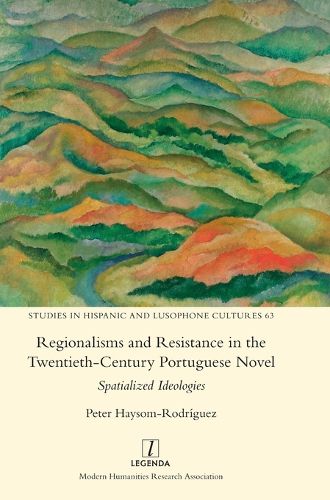Readings Newsletter
Become a Readings Member to make your shopping experience even easier.
Sign in or sign up for free!
You’re not far away from qualifying for FREE standard shipping within Australia
You’ve qualified for FREE standard shipping within Australia
The cart is loading…






This title is printed to order. This book may have been self-published. If so, we cannot guarantee the quality of the content. In the main most books will have gone through the editing process however some may not. We therefore suggest that you be aware of this before ordering this book. If in doubt check either the author or publisher’s details as we are unable to accept any returns unless they are faulty. Please contact us if you have any questions.
Often regarded as a small and homogeneous country, modern Portugal has frequently displayed clear regional tensions, on several 'axes': between its capital, Lisbon, and more neglected cities and towns; between its developed coastline and its (noticeably declining) inland villages; between the relatively conservative small-holding communities of the North and the politically radical tenant farmers of the South, amongst others. Examining twentieth-century novelists' treatment of such geographical precepts leads one to ponder: what relationships exist between ideology and (regional) spaces? Through analysis of narrative fiction, how can one better comprehend the complex geographical grievances and identity politics that are increasingly characterising ideo-logical discourses across Western nations? The novels of Aquilino Ribeiro (1885-1963), Agustina Bessa-Luis (1922-2019), Lidia Jorge (1946-) and Jose Saramago (1922-2010) all have their part to play, in this quest for greater understanding of Portuguese regionalisms and resistances.
Peter Haysom-Rodriguez is a Lecturer in Modern Languages at the University of Leeds. He holds a Ph.D. in Portuguese & Lusophone Studies from the University of Nottingham.
$9.00 standard shipping within Australia
FREE standard shipping within Australia for orders over $100.00
Express & International shipping calculated at checkout
This title is printed to order. This book may have been self-published. If so, we cannot guarantee the quality of the content. In the main most books will have gone through the editing process however some may not. We therefore suggest that you be aware of this before ordering this book. If in doubt check either the author or publisher’s details as we are unable to accept any returns unless they are faulty. Please contact us if you have any questions.
Often regarded as a small and homogeneous country, modern Portugal has frequently displayed clear regional tensions, on several 'axes': between its capital, Lisbon, and more neglected cities and towns; between its developed coastline and its (noticeably declining) inland villages; between the relatively conservative small-holding communities of the North and the politically radical tenant farmers of the South, amongst others. Examining twentieth-century novelists' treatment of such geographical precepts leads one to ponder: what relationships exist between ideology and (regional) spaces? Through analysis of narrative fiction, how can one better comprehend the complex geographical grievances and identity politics that are increasingly characterising ideo-logical discourses across Western nations? The novels of Aquilino Ribeiro (1885-1963), Agustina Bessa-Luis (1922-2019), Lidia Jorge (1946-) and Jose Saramago (1922-2010) all have their part to play, in this quest for greater understanding of Portuguese regionalisms and resistances.
Peter Haysom-Rodriguez is a Lecturer in Modern Languages at the University of Leeds. He holds a Ph.D. in Portuguese & Lusophone Studies from the University of Nottingham.